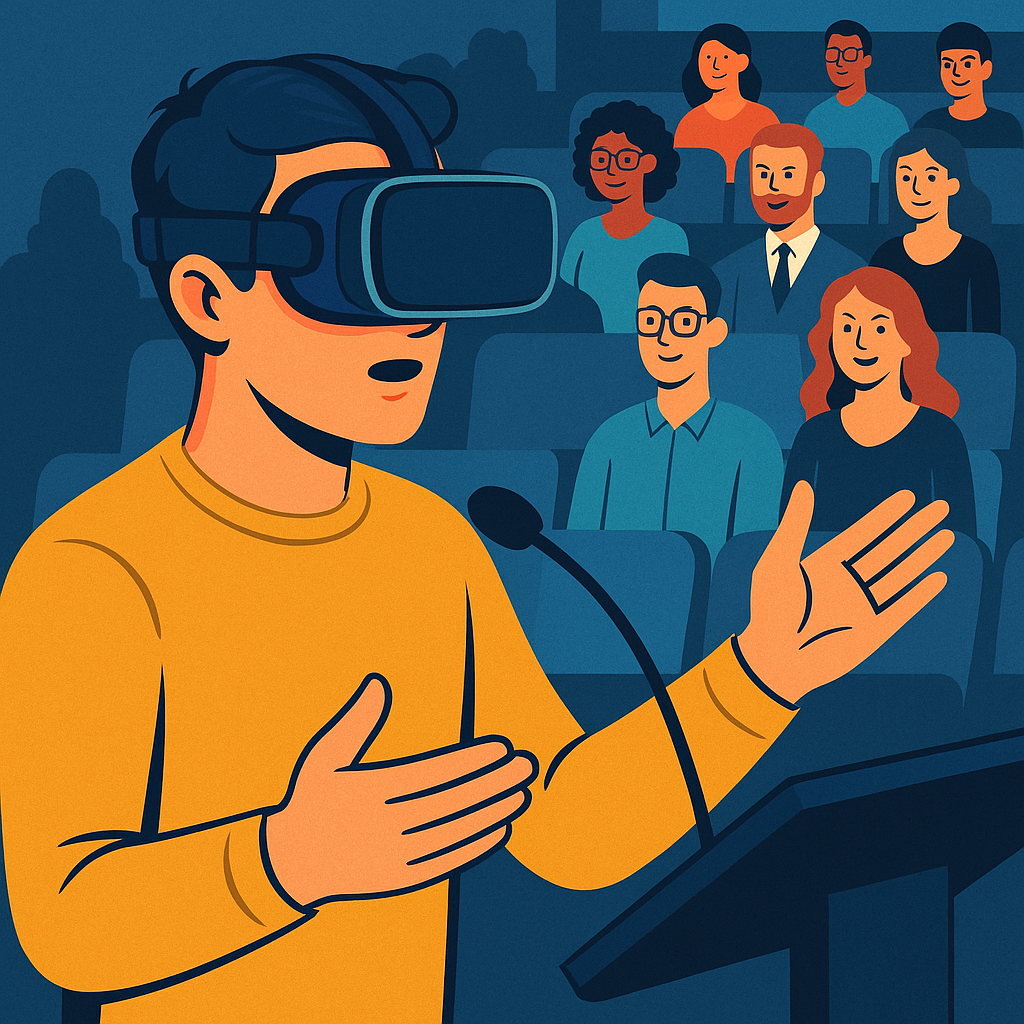Struggling with stage fright or stuttering during presentations? Virtual Reality Public Speaking Skills Training is taking the fear out of speaking and boosting confidence levels like never before. Affordable VR apps and tools are now offering immersive environments that simulate real audiences—and they’re becoming the hottest way to sharpen your speech skills without judgment.

Why Traditional Public Speaking Training Is No Longer Enough
Conventional public speaking classes, such as Toastmasters or university communication courses, are undeniably helpful. But they fall short in one critical area—replicating the pressure of a real audience. Reading from cue cards in a classroom can never match the anxiety of facing a sea of unfamiliar faces during a high-stakes pitch or keynote.
A growing body of research confirms that exposure-based training—gradually introducing individuals to fear-inducing scenarios—can desensitize anxiety responses. However, the logistics of setting up live audiences for repeated practice are impractical. This is where Virtual Reality Public Speaking Training steps in to fill the gap.
VR Training: Immersion That Builds Real Confidence
Virtual Reality (VR) places users into meticulously crafted, realistic scenarios. Whether it’s a packed conference room, an academic lecture hall, or even a hostile press conference, VR offers a safe environment to rehearse, fail, learn, and try again.
Leading platforms like Ovation and VirtualSpeech are equipped with intelligent features:
- Realistic Audience Reactions: Facial expressions, head movements, and sounds simulate live audience behavior.
- Performance Feedback: Metrics like eye contact, filler word usage, volume, and pace are tracked and presented for improvement.
- Custom Scenarios: Users can upload personal speech scripts and choose settings that match their upcoming engagements.
According to a study published in Frontiers in ICT, participants using VR public speaking tools reported significantly reduced anxiety levels and improved delivery confidence after repeated sessions (Monteiro et al., 2020).
Affordability Meets Accessibility: No Stage Needed
Until recently, such immersive training was reserved for elite institutions or corporate training budgets. Now, all you need is a $299 headset and an app subscription under $15/month.
Ovation, for example, offers robust VR training modules that simulate job interviews, TED-style talks, and more—all from your living room. Even Meta Quest headsets now feature dozens of public speaking simulators available via VR app stores.
This cost-effective accessibility is encouraging widespread adoption not just among professionals, but also high school students, job seekers, and ESL learners.
How to Structure Your Practice with VR Tools
1. Start Small
Begin with basic speech outlines. Focus on simple greetings, elevator pitches, or self-introductions.
2. Repeat in Varying Environments
Once confident in one setting, change environments. Go from a classroom to a stadium simulation. Exposure to different noise levels and crowd sizes boosts adaptability.
3. Track and Analyze Metrics
Make use of in-app analytics. Many tools provide scorecards on voice projection, speech clarity, and engagement levels. Compare week-by-week progress.
4. Simulate Real Stakes
Upload real scripts for upcoming presentations. Practice in scenarios that mimic your target event.
Real-World Success: Who’s Using VR to Train?
Business Professionals
Companies like Deloitte and Accenture are already using VR-based training modules to prep their teams for presentations and leadership speeches.
Students & Educators
Some universities in the U.S. and Europe have incorporated VR into public speaking curricula to offer richer student learning experiences.
Mental Health Advocates
Therapists use VR speech apps as part of treatment for Social Anxiety Disorder and Selective Mutism. Controlled exposure combined with cognitive-behavioral strategies has shown promising outcomes (Anderson et al., 2013).
The Psychology Behind Its Effectiveness
VR’s power lies in its ability to trick the brain. Though users know the audience isn’t real, their heart rate, sweat response, and anxiety levels mimic genuine stress.
This phenomenon, known as presence, allows the user to rehearse under realistic psychological conditions without real-world consequences.
Repeated exposure under such simulated pressure facilitates:
- Desensitization to performance anxiety
- Cognitive restructuring (challenging negative beliefs about public speaking)
- Muscle memory and improved delivery fluency
A recent white paper by VirtualSpeech noted that over 85% of users reported improved public speaking performance after just five sessions (VirtualSpeech, n.d.).
The Future: AI-Powered Feedback and Eye-Tracking
Next-gen features are already being deployed:
- AI Analysis of Tone and Emotion: Helps speakers learn when their voice sounds unconvincing or too monotonous.
- Eye-Tracking Technology: Encourages better audience engagement by discouraging reading and promoting natural eye contact.
These tools, when paired with VR immersion, offer a training experience that is arguably superior to real-world rehearsal in many respects.
Final Thoughts: The New Standard in Speech Training
The era of VR-based public speaking training is not just a trend—it’s rapidly becoming the gold standard. With affordability, realism, and measurable outcomes, VR tools offer what traditional methods can’t: scalable, consistent, and psychologically rich practice.
For those looking to ace their next interview, TED Talk, or even classroom presentation, investing in a VR speech coach might just be the smartest move in 2025.
References:
- Monteiro, D., Liang, H.-N., Li, H., Fu, Y., & Wang, X. (2020). Evaluating the Effect of Audience in a Virtual Reality Presentation Training Tool. Frontiers in ICT. Available at: https://www.frontiersin.org/articles/10.3389/fict.2017.00013/full (Accessed: 28 May 2025).
- Ovation (n.d.). Ovation – VR Public Speaking Training. Available at: https://ovationvr.com/ (Accessed: 28 May 2025).
- VirtualSpeech (n.d.). VirtualSpeech – VR Courses for Public Speaking. Available at: https://virtualspeech.com/ (Accessed: 28 May 2025).






